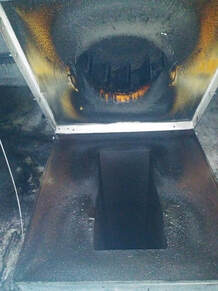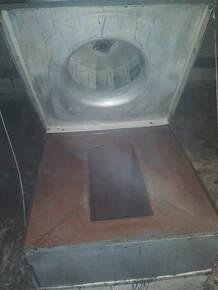|
Commercial kitchen hood systems play a vital role evacuating smoke, heat and odors from cooking areas. Overtime, kitchen managers find themselves determining the levels of grease buildup within the kitchen hood ventilation system. If grease builds up, a safety hazard to both employees and dining patrons pose a great risk. The leading cause of kitchen fire is grease buildup. Proper maintenance and thorough cleaning of the exhaust hood filters, exhaust hood and ductwork can reduce this safety hazard. The National Fire Protection Agency requires all commercial kitchens to professionally clean the kitchen hood ventilation systems. The inability to meet these requirements not only increases the chance of kitchen fires but large fines along with forced closure of the kitchen facility. Best practices are laid out in NFPA 96 guide for the exhaust hood cleaning. The guide includes the frequency of cleaning for different types of kitchens:
Kitchen employees are relied on to clean the outside surfaces of the exhaust hood system as part of their role. The deeper cleaning, laid out in NFPA 96 guide, is to be carried out by trained hood cleaning professionals.  The scope of exhaust hood cleaning work is as follows:

Certified experts in commercial kitchen hood cleaning is a necessity for any commercial cooking operation, both to reduce the risk of fire and avoid noncompliance. Hood Master Service is a reputable hood cleaning service and happy to walk you through their procedures, provide “before and after” photos, and work with kitchen management to ensure safety and compliance. Hood Master Service is commercially insured and in compliance for hospitals, schools, universities, airports, nursing homes, restaurants & malls. Contact Hood Master Service for a free kitchen hood system inspection and evaluation.
0 Comments
|
AuthorAlberto Isola has been cleaning hoods since 1995. He understands the proper maintenance and thorough cleaning is imperative for today's busy commercial kitchens. Archives
Categories |
|
Connect With Us
Member of NFPA
|
Hood Master Service, LLC is an equal opportunity employer committed to a diverse and inclusive workforce. Hood Master Service is a drug free workplace. The unlawful manufacture, distribution, dispensing, possession or use of a controlled substance is prohibited and may result in dismissal.
© 2022 Hood Master Service, All rights reserved.
5331 Primrose Lake Cir Suite 227 Building 5 Tampa, FL 33647
Website by eDirect, Inc.
5331 Primrose Lake Cir Suite 227 Building 5 Tampa, FL 33647
Website by eDirect, Inc.

 RSS Feed
RSS Feed


